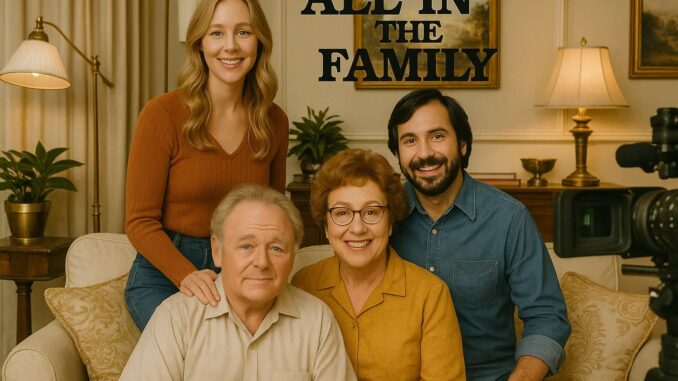
When All in the Family first premiered in 1971, few could have predicted just how deeply it would shape American television and the cultural landscape that followed. For nine groundbreaking seasons, the series invited viewers into the modest Queens home of Archie and Edith Bunker — a place where laughter met uncomfortable truths, and where the ordinary became unforgettable.
At its heart, the show wasn’t just about comedy; it was about confrontation — the clash between old and new, conservative and progressive, ignorance and understanding. Archie Bunker (played brilliantly by Carroll O’Connor) represented a generation struggling to adapt to a rapidly changing world, while his loving yet often exasperated wife Edith (Jean Stapleton) stood as his gentle counterbalance. Alongside their daughter Gloria (Sally Struthers) and her liberal husband Mike (Rob Reiner), the Bunkers became a mirror for America itself — divided, passionate, but still somehow bound together by love.
As the years passed, All in the Family evolved beyond its sitcom roots. It dared to tackle topics most shows of the era wouldn’t touch — racism, women’s rights, the Vietnam War, religion, and class inequality — all without ever losing its humor. But by 1979, both Norman Lear, the show’s visionary creator, and its cast knew the time had come to say goodbye.
The final episode, “Too Good Edith,” was a perfect distillation of everything All in the Family stood for: honesty, humanity, and heartbreak wrapped in simplicity. Edith, secretly ill but too devoted to let Archie down, pushed herself beyond her limits to help him host a St. Patrick’s Day event. When her illness was revealed, and Archie realized how much he had taken her for granted, audiences saw something rare — Archie Bunker stripped of bluster, confronting his deepest fear: losing Edith.
That quiet, teary confession — “I’m nothing without you” — became one of television’s most haunting goodbyes. It wasn’t grand or melodramatic. It was real, raw, and deeply human — just like the show itself.
Though All in the Family officially ended that night, its influence didn’t. The spin-off Archie Bunker’s Place carried the torch for a few more years, but fans still point to “Too Good Edith” as the true emotional ending of the saga.
More than four decades later, All in the Family remains a cultural touchstone — not only because it made us laugh, but because it made us think, and sometimes, made us cry. In the words of Norman Lear, “It was never just about Archie. It was about America — and America was always worth watching.”